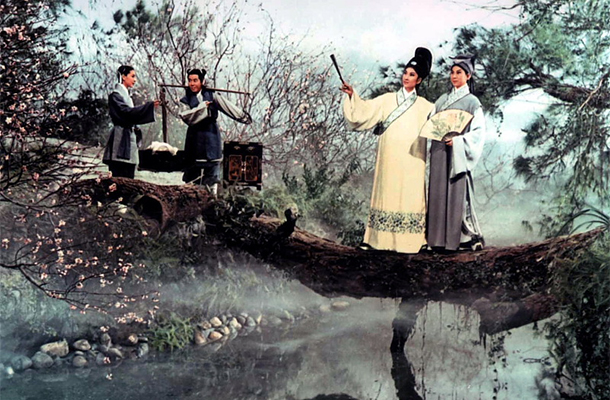
TIFF’s A Century of Chinese Cinema Review: The Love Eterne (1963)
Cast: Li-chu Chang, Yanyan Chen, Kuang Chao Chiang
Director: Han Hsiang Li
Country: Hong Kong
Genre: Musical
Editor’s Notes: The following review is part of our coverage for TIFF’s A Century of Chinese Cinema which runs from June 5th to August 11th at TIFF Bell Lightbox. For more information of this unprecedented film series visit http://tiff.net/century and follow TIFF on Twitter at @TIFF_NET.
The monumental Shaw Brothers logo hits the screen, but rather than the punches and kicks that would usually follow it would be followed by a sensitive modernism forgotten in the annals of literature and its acceptable subversive elements. The logo is succeeded by watercolor paintings and songs of the wistful tragedies of unrequited love, fading into cherry blossoms over a Pierre-Auguste Renoir’esque bridge, filling the frame with impressionistic hues as the wind moves the willow and cherry trees in the soft endless dance of nature in this revolutionary musical of masked sexual identities and the tragic story of two verboten lovers seeking knowledge and love in times of Confucian gender inequity.
The logo is succeeded by watercolor paintings and songs of the wistful tragedies of unrequited love, fading into cherry blossoms over a Pierre-Auguste Renoir’esque bridge, filling the frame with impressionistic hues as the wind moves the willow and cherry trees…
 Exposition in The Love Eterne is delivered through song, quickly establishing the plight of the young and ambitious Zhu Ying Tai as we watch the ornamental surroundings of her empty life in deep focus widescreen daydreams. The songs are brash and frank in their overt feminism, showing a maturity of its filmic ideologies, wistful but unyielding as social inequities are attacked and traditional gender roles challenged with lyrics of subversive empowerment. She wishes to attend school where she can nurture her obsession with books, but such pursuits are unbecoming of a woman from her high social standing and her traditionalist father could not bear such shame tainting his house with the potential of scandal. A plan is devised by Zhu Ying Tai’s sister that would allow a scandal-free pursuit of her dreams of an education. In a paper thin guise she would disguise herself as a man and learn the virtues of conformity and memorize the woman-free stanzas of Confucius.
Exposition in The Love Eterne is delivered through song, quickly establishing the plight of the young and ambitious Zhu Ying Tai as we watch the ornamental surroundings of her empty life in deep focus widescreen daydreams. The songs are brash and frank in their overt feminism, showing a maturity of its filmic ideologies, wistful but unyielding as social inequities are attacked and traditional gender roles challenged with lyrics of subversive empowerment. She wishes to attend school where she can nurture her obsession with books, but such pursuits are unbecoming of a woman from her high social standing and her traditionalist father could not bear such shame tainting his house with the potential of scandal. A plan is devised by Zhu Ying Tai’s sister that would allow a scandal-free pursuit of her dreams of an education. In a paper thin guise she would disguise herself as a man and learn the virtues of conformity and memorize the woman-free stanzas of Confucius.
Secrets would inevitably be revealed, but their love would remain insuppressible through every revelation only to be torn asunder by Zhu Ying Tai’s betrothal to another man by her conservative parents.
 She sets out on her deceptive pursuits and meets another student near the Renoir bridge of the southern mountains, and the two declare their eternal “brotherhood” in the reflection of the murky spring waters that flow under the bridge, framing the two in the soft reflection of willow branches and cherry blossoms as the image shimmers, rendering the frame as soft and gentle as their unattainable dream of equality as it quickly vanishes with the ethereal whispers of running spring waters. Seasons would come and go and the two “brothers” would remain sublimely unaware of the true identity of one another as they grew closer during their three years of study together. Secrets would inevitably be revealed, but their love would remain insuppressible through every revelation only to be torn asunder by Zhu Ying Tai’s betrothal to another man by her conservative parents.
She sets out on her deceptive pursuits and meets another student near the Renoir bridge of the southern mountains, and the two declare their eternal “brotherhood” in the reflection of the murky spring waters that flow under the bridge, framing the two in the soft reflection of willow branches and cherry blossoms as the image shimmers, rendering the frame as soft and gentle as their unattainable dream of equality as it quickly vanishes with the ethereal whispers of running spring waters. Seasons would come and go and the two “brothers” would remain sublimely unaware of the true identity of one another as they grew closer during their three years of study together. Secrets would inevitably be revealed, but their love would remain insuppressible through every revelation only to be torn asunder by Zhu Ying Tai’s betrothal to another man by her conservative parents.
The underlying passion would come bubbling to the surface in daring cinematic flourishes, both in subject matter and imaginative embellishments as it tackles taboo subject matter in emotionally mature and cinematically awe-inspiring ways. Rain would fall into the spring waters that once carried their disguised reflections, mourning for the misfortunes that would drive the lovers apart. The earth would shake and the sky would part to bring closure to this tragic story of unrequited love, and the two flutter into eternity as butterflies, escaping the rule of propriety and strict fathers as the everlasting divinity of heaven would be the only place that would allow their disallowed love.
Related Posts
Matthew Blevins
Latest posts by Matthew Blevins (see all)
- Subversive Saturday: The Bunny Game (2010) - July 21, 2013
- Subversive Saturday: Farewell, Amos Vogel - July 13, 2013
- TIFF’s A Century of Chinese Cinema Review: The Love Eterne (1963) - July 13, 2013
































